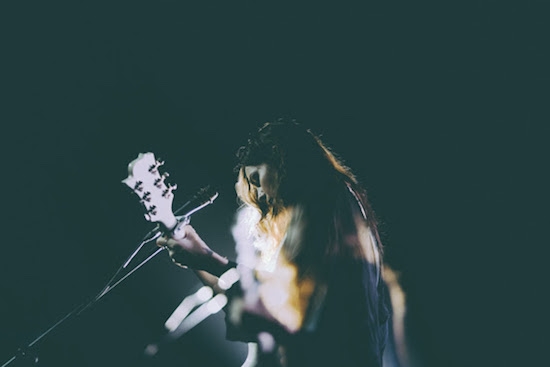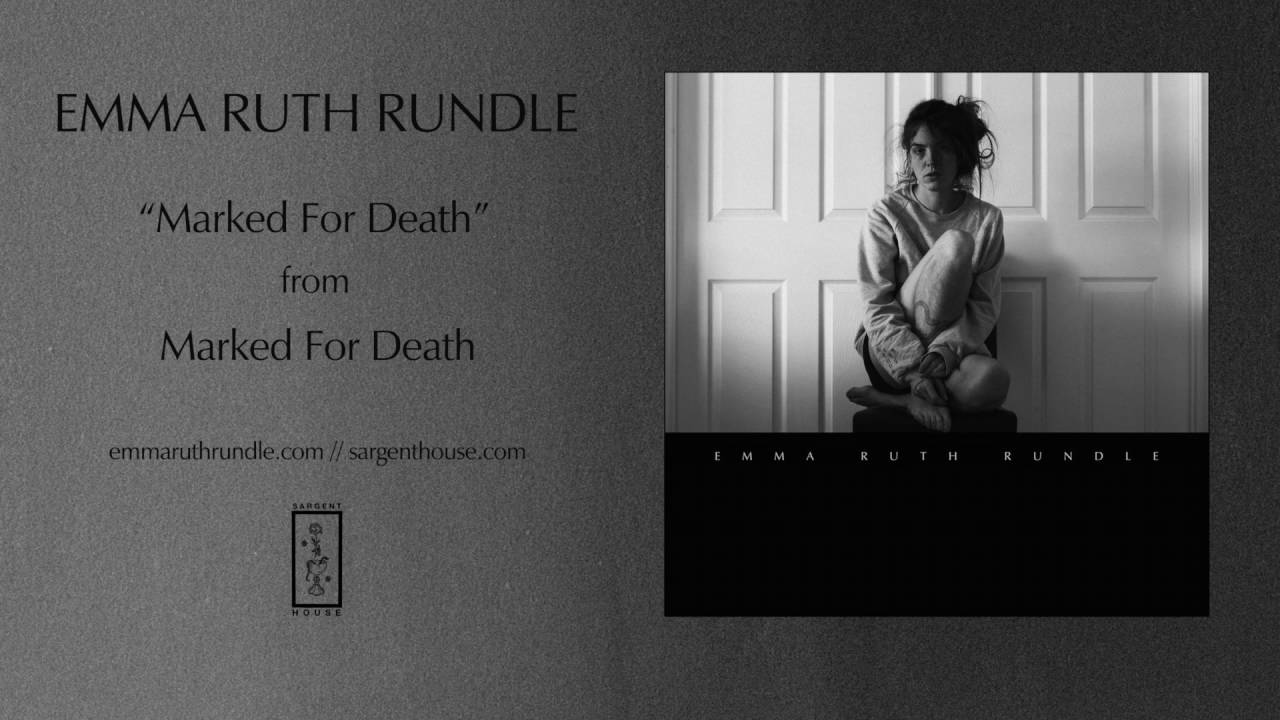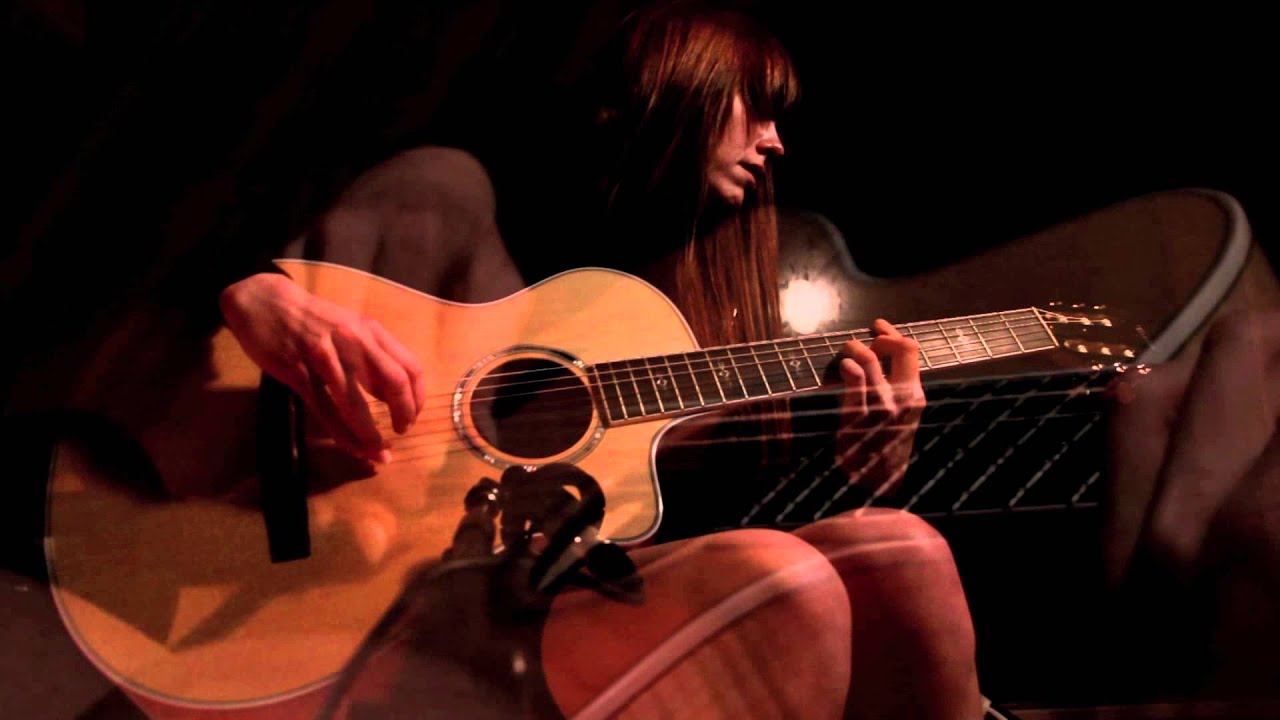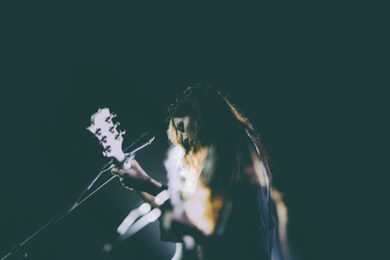“Having some power troubles”, Emma Ruth Rundle texts around the time we’re due for our chat. Thank God, I think. I really, really need to piss. I go upstairs and see her on the way to the toilet. “Oh hi!” she says, and we hug. “Sorry, I need to pee. One sec.”
We meet again shortly after, downstairs in the pub she’s playing at in Brighton. Her bandmates are swigging cans of Kronenbourg, while Emma sips a glass of Diet Coke. The sensible choice is startling. Her previous album, Marked For Death may not have existed without its base of store bought booze – not in its final form, anyway.
The album saw her ‘spinning out into a bottle’, confronting the edge of death, praying to a God she’s not sure she believes in to try and redeem her. There’s no final proverb. Someone felt like shit and they made an album about it. There’s defiance in that. In the age of self-care, musicians are valued for their ability to overcome dysfunctional coping mechanisms and to recover.
So, what about the listener who can’t? In the mire of drinks, drugs, dysfunctional relationships, these people will find that there’s only so much that others can withstand. Friends can’t be enablers, lovers can’t be nurses, parents don’t live forever. Emma’s music provides them with an ongoing assistant to their pain. Both on record and sat in front of me, it’s clear that her heart is immense. She’s sensitive to everyone around her, she offers me American Spirit cigarettes, she takes a sip of Diet Coke.
I feel like now is a good time to talk to you, because we’re in that time between your last record and the next thing. Do you have an idea of what that’s going to be yet?
Emma Ruth Rundle: I’m going to be recording a new record and going into the studio in March. I have a whole album’s worth of new material. So the idea is to do the record with a full band and then on top of that I’d like to do a shorter release of just acoustic songs, more raw and guitar-focused pieces.
What do the new songs sound like?
ERR: They’re long and it’s kind of more post rock than what I’ve released before. I think that’ll surprise people. If post rock elements existed in my music before, it’s kind of gone to another level now.
There are some noticeable changes in you from when you were last touring in the UK eight months ago. For one, you seem to be drinking less.
ERR: Yep, now before I go on I just drink these fake beers instead of starting early. I am still drinking, and I begin around the time the second act starts playing.
Why wait until then?
ERR: Because if I start early, I won’t be able to stop and I’ll be completely fall-down drunk by the time I start to play.
Why aren’t you able to stop?
ERR: I think it’s called alcoholism, I’m not sure [laughs]
You’ve been through bouts of sobriety. What’s that like?
ERR: It’s really intense, it’s stressful. I think it’s necessary. I’m a conflicted person in that way, in that it’ll just get to a certain level where it has to stop.
When you write a record like Marked For Death, which is so personal, the listening experience can feel undeservedly intimate. Most of us are strangers to you, yet we’ve been given a window into your own personal pain.
ERR: I think that’s a natural reaction. When the music is intense and emotionally heavy, it connects with people in that way, and sometimes in an unhealthy way. I mean, I don’t ever wanna say anything that would put any of my fans off, because it means the world to me that anyone listens to my music, and that it means something to them.
In terms of your arc, both as a songwriter and as a human being, do you feel a pressure to make the next album positive and hopeful?
ERR: Yeah, in terms of longevity, in my health and my own life I need to find a way to focus less on super negative things, but I do think that one of the themes in my music is hope, and I don’t think that’s unhealthy.
How about a pressure to appeal to a narrative of resilience and recovery?
ERR: I think I’d have to go through a very complicated thought process to answer that question. It is the sort of thing that I think about a lot, and I do feel some pressure in some way. But at the end of the day, the songs that I’ve written… I don’t know. I’m not ever gonna be ashamed for how I am and how I will be. I mean, obviously there’s still a struggle with the amount of drinking I do, but I think these are lifelong struggles for certain people.
What’s the draw towards drinking?
ERR: It’s the best painkiller on Earth.
You experience a lot of physical pain as well, don’t you?
ERR: I actually haven’t in a while. I had a surgery last year that really helped me. [she pauses] I don’t know. I have a load of crazy thoughts. In terms of this year, I’ve just been trying to get through it. I think I have a deep desire to have more of a structure and a self-disciplined approach to living. I don’t think I’m capable of exacting that while I’m on tour like this. It’s kind of like, you do whatever you can to get through it. Drink, eat a million french fries.
Will you be with your family at the end of this tour?
ERR: I’m not sure. If I go to Oregon I’ll be with my sister. I actually went on a tour with her. She was selling the merch and helping me, and I would sing that song [‘Sarah’, a song dedicated her] and people started talking to her and wanting to know about her personal life. It began to freak her out. I used to put her on my social media and people would follow her on there and at shows. So, I completely stopped performing that song at shows and I stopped discussing who my songs are about. It’s one thing when people cross my personal boundaries, because that happens every single day, but it’s another when they do it to my family and friends. I’ve gotta protect those people.
How do you deal with it when people cross that line?
ERR: It’s difficult. You have to be gracious and available to the people who wanna talk, so that you’re doing a service to the people who are listening to your music. But you can’t engage with or entertain behaviour that crosses a line. It ranges from somebody just wanting to give you a hug, to people writing me completely destroying, strange letters about some very deep story between us that isn’t real. It’s getting to a point, and I’m not sure if it’s just exhaustion from tour [sighs] yeah.
Yeah
ERR: Yeah.





